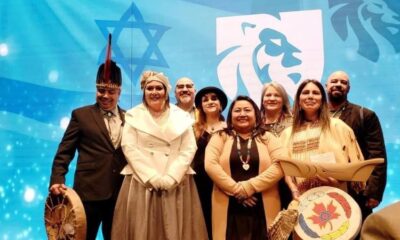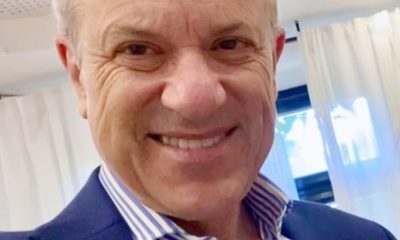
Israel

Ex-Davidian represents IDF to the world
The COVID-19 pandemic coughed up some unusual situations. For 24-year-old Kelly Odes, it was serving in the Israeli army in her pyjamas. Granted it was only for some of the time – during the country’s worst lockdowns – but even that couldn’t keep the spirited Joburger from being on call 24 hours a day.
In Israel, it’s a big deal to be chosen to serve in the spokespersons unit of the Israel Defense Forces (IDF). Odes had been in the country for only three years when she bagged this achievement. In that short time, she also graduated valedictorian with a BA in Government from Reichman University (formerly IDC Herzliya) and represented Israel in the United Nations conference as part of the Young Ambassadors Programme. Recently, she was chosen by the IDF’s operations division commander as an “outstanding soldier”.
Odes attributes a large part of her success to the education she received at King David Linksfield, where she earned six distinctions.
“It was top class. I was nervous to come to Israel because you hear how innovative the country is and I was thinking maybe I won’t be up to par coming from South Africa. But King David equipped me, not only academically, but also gave me confidence and ambition. I definitely got that from my school. My Zionism I got from the South African Jewish community – the passion that South African Jews have for Israel. A lot of other diaspora communities don’t have that strong connection.”
It was only during her studies in Israel that she decided to join the army.
“I was one of the only international students in a special honours programme. There were a lot of Israelis, and most of them were officers in the army. They used to talk all the time about their experiences in the IDF, and I wanted to be part of their conversation. I realised the impact the army has on everyday life in Israel, and signing up was a way for me to contribute fully to the country.”
It also helped with learning Hebrew because even though Odes had obtained a distinction in matric, she wasn’t fluent. But she had to fight for a place in the army’s spokesperson’s unit.
“I had to push and beg for it. I’m really lucky because in the army you can’t always decide where you’ll be placed. My experience in the unit has been absolutely incredible. It’s challenging because specifically on the internet, in public diplomacy, and the media, the world is very hostile towards the IDF and Israel. So every day, my colleagues and I have to be motivated to keep going, no matter how much the world tells us no, and it’s amazing the impact we have.”
Odes points out that whereas 10 years ago there was little mention of Hamas as a terror organisation in the mainstream media, today the situation is different. There’s also more coverage about the group committing war crimes. She attributes this in part to the success of the spokesperson’s unit, but admits there’s still a general bias against Israel that she finds difficult to explain.
“No matter the efforts from Israel, from the ministry of foreign affairs, and from every pro-Israel group to try and push up the image of Israel, there’s an inherent bias out there. One could call it antisemitism.
“The goal of the press is to expose a truth, and everyone’s truth is different. We [the IDF] often don’t get enough of a chance to speak. We give responses, but only some of them are used or are used in a twisted way. It’s a constant fight to try to expose our truth, and it’s a matter of whether they’re open to hearing it or not.”
Odes works behind the scenes, setting up interviews with reporters and editors, and responding to requests that run the gauntlet from benign to outright hostile in an effort to get the IDF’s voice out there. Often, it’s an uphill battle. Though she wouldn’t go as far as to call it an information war, she believes information is key.
“It’s key to winning an online war. During Operation Guardian of the Walls [the most recent Israel/Gaza flareup] we released as much information as we could all the time. But unfortunately, in the press, Gaza is always portrayed in a more sensitive way than Israel. It’s hard for us when the information we give is blurred or gets left out.”
The battlefield has moved online and into social media, where news can go viral, regardless of whether it’s true or not.
“One influencer with millions of followers can say something, and most people won’t even check to see if it’s based on fact. That really gives us problems as it’s so hard to get real facts to go viral when there are fake facts going around. People are trying to get slogans and headlines out so they can push notifications that are strong. Very few read the whole article anymore.”
The recent Gaza war kept her on her toes.
“It was crazy. I started on night shift and would sleep in the day. But you can’t really sleep in-between sirens and everyone messaging you. Journalists have my personal number, so they’d call me constantly. It was also the first time I’d ever heard a rocket, so I’d be running to a shelter and holding my phone up to get signal to try and tell the world what was going on.”
Odes’ service ends in March next year, and she’s been offered the option of extending it and becoming a commander. She’s also toying with the idea of working in the prime minister’s office or foreign affairs department in policy making or security. Her time in Israel has taught her that “nothing is impossible; to always keep pushing for what you want”. We’re likely to hear a lot more about Odes in the future!











Tanya Silverman
November 18, 2021 at 8:38 pm
כל הכבוד קלי-די